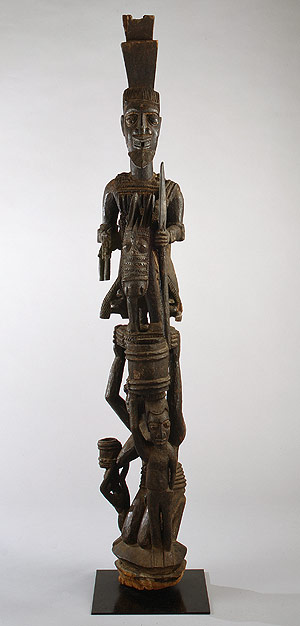
 |
|
|||||||||||||||||||||||||||||||||||||||||||||||||
 |
The Present
Awakened to the world beyond the forest kingdoms, the Yoruba emerged from the colonial period better integrated as a unit of peoples. Not to say that the tribal differences had completely gone, but in the light of a common enemy, the various Yoruba groups realized more than ever that their futures was inextricably linked. They also realized that to supplant the colonialist they had to work together with the other ethnic groups that now comprised the Colony and Protectorate of Nigeria. The leaders of the Yoruba's joined the leaders of other ethnic groups in forming and sustaining political parties which turned out to be potent weapons against the continued foreign domination. |
But where have we arrived? Where has our giant strides through history taken us? The destiny of the Yoruba has now become intimately connected with those of its immediate neighbours. Yorubaland is no longer as real as it once was a few centuries back. It now only lingers in the spirit of those who wander what West Africa would have been like without the intervention of the Europeans. The turmoil, it seems, that had plagued the Yoruba (and large sections of West Africa for that matter) for some periods over the last two centuries, still remained within the country of Nigeria. Possibly, if not for the Europeans the instability that as wracked the area would have ran its course and would have been resolved. But since breaking from the stranglehold of colonialism the country of Nigeria has had a very turbulent existence. The first elections were held in 1964, just fours years after independence was gained. However it was tumultuous start, as the elections were marred by boycotts and violence. The main opposition the United Progressive Grand Alliance (UPGA) party refused to take part leaving the Nigerian National Alliance (NNA) to win with a large majority. The UPGA held supplementary elections of their own in the Eastern region of Nigeria winning every seat. Two years later in a climate of unrest the leader of the NNA Abubaka Tafawar Balewa was killed in a coup led by Major-General Johnson Aguiyi-Ironsi an Igbo from the Eastern region. The climate was set thereafter for the next few decades of politics in Nigeria. In just a few months Aguiyi-Ironsi was killed in yet another coup led by prominent members of the northern regions who thereafter appointed Lieutenant-Colonel Yakubu Gowon from the Christian North as their leader. Relations deteriorated between the Federal Government and the Igbos of the Eastern region. Until in 1967, the Eastern region proclaimed its independence as the Republic of Biafra. War inevitably broke out between the two factions. Up to a million died in the conflict mainly through starvation before the Federal government forced a Biafran surrender. After a number of false promises of free elections from Yakubu Gowon, he was eventually overthrown in a bloodless coup in 1975 by Brigadier Murtala Ramat Muhammed. He had only a short stint in power before he was assassinated and replaced by the Yoruba, Lieutenant-General Olusegun Obasanjo.
Modern Nigeria Nigeria in many ways is blessed. It has an abundance of natural resources. It has over the last few decades become a major oil producing nation. It has the capacity to sustain a booming agricultural industry. Its human resources is just as rich. With a population of more than 130 million people Nigeria 's potential seems almost limitless. However echoes of the recent past still rocks the country and as a result a number of persistent problems plagues Nigeria. For example insecurity has become a major problem in the country, where several thousand people have been killed recently in ethnic and religious violence. Another serious problem is that of corruption which is almost endemic in Nigeria. With the country frequently ranked the worlds most corrupt by campaign group 'Transparency International'. Poverty is also an issue, with some 66% of the population still living on less than $1 a day a figure similar to poor countries which are not blessed with oil. Some of these problems are just plain frustrating when we realize that Nigeria is one of the top oil producing nations of the world. Exporting more than 1.86 million barrels of crude oil a day how is it that Nigeria still hasn't built new refineries so that it no longer has to import the refined product at a far higher price? Where does all the wealth go? How can two thirds of the people be living below the poverty line when Nigeria is Africa 's second largest economy and has reaped more than $280 billion from oil in the past 30 years? With 65% of Nigerians still living in rural areas why hasn't the vast amounts of money generated from oil been put back into agriculture in order to raise the standards of living of the very poor?
|